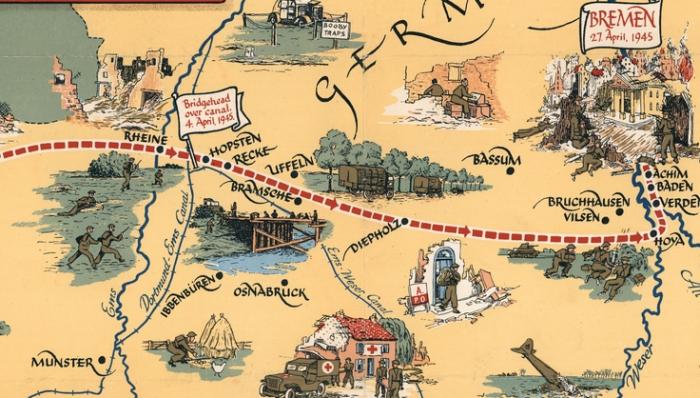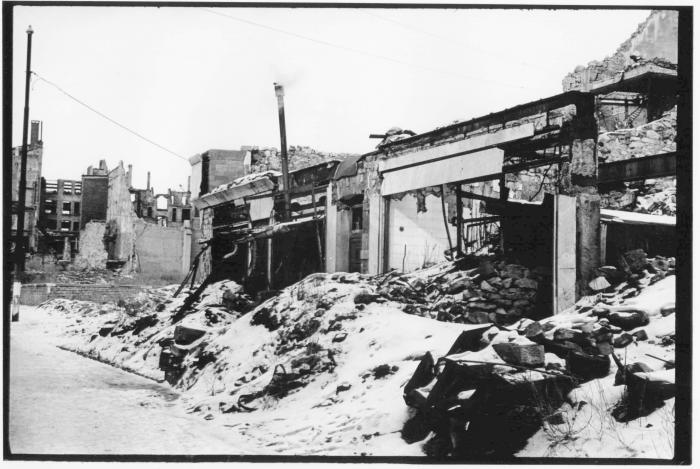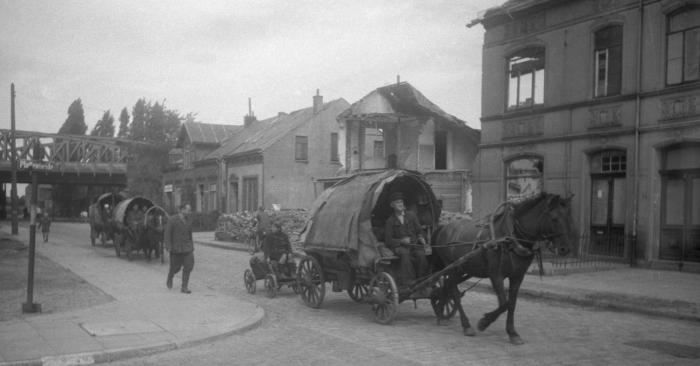 In this moving docu-drama, some 70 years after British forces crossed the Rhine (March 24, 1945) Bremen historian Diethelm Knauf and the History and Culture Centre in Bremen’s harbour district Walle re-visit peoples‘ reactions when they came face to face with the „enemy“. Achim Saur scoured state archives and Knauf researched British and US archives, even travelling to the UK to video-record interviews with members of the Scottish 51st Highland Division – one of three which captured the city.
In this moving docu-drama, some 70 years after British forces crossed the Rhine (March 24, 1945) Bremen historian Diethelm Knauf and the History and Culture Centre in Bremen’s harbour district Walle re-visit peoples‘ reactions when they came face to face with the „enemy“. Achim Saur scoured state archives and Knauf researched British and US archives, even travelling to the UK to video-record interviews with members of the Scottish 51st Highland Division – one of three which captured the city.
It was a time of change, insecurity and fear of the future. One woman wrote in her diary: „What the future will bring nobody knows, rumors are rampant, you cannot grasp what is happening, you only feel a deep pain in your breast.“
 The Scottish 52nd Division advance on Bremen
The Scottish 52nd Division advance on Bremen
The key question guiding the historians’ research was, what actually was the first impression people had of the „enemy“, when they first encountered them. Knauf explains: „We were not interested in repeating the stories of chewing gum, nylons and reconciliation. We believe that these stories were reconstructed later to serve political purposes of the late 1940s. In April/May 1945 there must have been animosity, hatred, fear“.
The result of this historical research is a unique snapshot of the times: British soldiers entering the city; searching for hidden weapons or German soldiers and the effect on private, family lives. Knauf’s impressions from interviewing British veterans was that British units had „lived through Hell“ in the fighting between Gennep and Goch, suffering continual artillery and mortar bombardment, sometimes with traumatised units needing to be pulled out of combat. Having surrounded Bremen, however, he says that the actual capture went relatively easily. Peter White, who as a lieutenant in the 52nd Lowland Division also lived through harrowing episodes (and kept a secret diary) recalls his memoir: „With the Jocks“ – and the battle for Uphusen.
How British soldiers perceived the Germans depended on their experiences. It made a difference if your family had been a victim of German air-raids on British cities, whether you witnessed the cruelties of the Waffen SS, whether you took part in fierce fighting and realised that the Germans were intent on killing you.
Interviewed on video, Bill Robertson, 51st Highland Division, says as an individual, he was keen to join the army to become part of „the movement towards freedom, liberation and democracy“. Later, after his experiences in France, Belgium and Holland, „sometimes it became more personal“ for example when a comrade had been killed or wounded and „altruistic feelings faded into the background“.
American Tony Vaccaro, later to become a famous photographer, hated the Germans because they had forced him to kill. To aim and fire became a traumatic experience for him, he said in an interview with Diethelm Knauf in 2001.
To document this terror with his camera was like a cure. But later in the 1940s when he travelled through Germany with his camera he, nevertheless, felt pity for the people living in the devastated cities. One shot of Bremen reveals his concern and sympathy. Focusing on the footsteps in the snow and the smoke coming out of the chimney of a stove he records the deplorable conditions many Bremener’s lived under and tried to survive the cold winter. His image preserves the memory of their misery. This was not the attitude of an arrogant conqueror.

Such emphasis was certainly not the rule and encountering the Waffen SS ’s brutal warfare changed a soldier.
John MacKenzie, 51st Highland Division, says in the video, after the capture of Bremen what triggered his greatest shock was the liberation of the Bergen Belsen concentration camp. They were not prepared for this „hell.“ Yet, referring to it, he would always differentiate between the Germans and the Nazis. The strange thing was, however, all Germans he encountered claimed „Ich nix Nazi“.
Labels like „chewing gum and nylons“ in the reconciliation period after the war, including the Marshall Plan, are not what British and American veterans remember – rather it was a lack of national hostility. The „Guide for British Soldiers“ (1944) set out appropriate attitudes to be shown to Germans after victory; democracy, self-confidence, strictness and ‚fair and square dealing‘ with the defeated nation.
How did it look from the Bremeners viewpoint? The State Archives holds a collection of diaries – unfiltered, personal perceptions of the British and later American soldiers and the occupation policy. In addition, there are texts written after a call from Mayor Wedemeier 50 years after the war ended for the „Weser Kurier“ newspaper. This collage tries to reproduce the mood of these writings.
„You cannot grasp what is happening… “ Bremeners recollections >>> translation
Fear of the enemy
Bremeners had spent the final days of the war almost continuously in underground shelters. Until April 1945, air raids were followed by British artillery bombarding German positions and the surrounding neighbourhood. Not everyone ventured out during lulls in the firing though later people longed to do so because of the unbearable heat in their shelters – one diarist recording temperatures of more than 40 degrees and lack of oxygen.
Many Bremeners only saw the „enemy“ when they left the shelters. British soldiers ordered people onto the streets to search for hidden soldiers and weapons. The impact of Nazi propaganda on the people can be seen in a testimony written in 1995 for the „Weser Kurier“, recording how, after soldiers had checked the shelter they gave out chocolate and chewing gum to children, but once inside the shelter again, the sweets were handed over to adults „because it was believed they were poisoned“.
„Because of his school English“ the late Senator Günther Czichon was delegated to open the shelter door to the soldiers. A black soldier pushed a machine gun against his stomach and asked if German soldiers were inside. „I said no and invited him in. My American friend had probably already heard about young German ‚werewolves’” says the account, adding “that he went off cursing, and I was left with the feeling he had been only slightly less frightened than I was“.
Among all the testimonies we find only one where relief at the end of the war turns into a real celebration. Probably the writer comes from one of the forced labourers‘ quarters, where the terror of the regime was felt most directly. „We saw the invasion of the troops as liberation and danced, laughed and cried with the whole neighbourhood from the bunker. The war was over for us. Nothing counted more than liberation from terror and war. Whatever might happen now could only be better“.
 Forced laborers welcomed the British troops, © Imperial War Museum, London
Forced laborers welcomed the British troops, © Imperial War Museum, London
After the fear – everyday encounters under occupation
An American training film for occupation soldiers, also used in the British Army, warned: „You will see beautiful countryside. Make no mistake. You are in enemy territory. Be constantly vigilant and suspicious“.
The directive warned against fraternisation. German people were not friends. The film „Your Job in Germany“ explained to the GI’s – in a rather crude way – the gritty story of German militarism and a ubiquitous Nazi underground. In the „British Zone Review“ a lively discussion developed as to whether the inhabitants of the devastated cities might not be approached with a „modest measure of compassion“.
So, in Bremen’s memories there were always stories that the „enemy“ would behave quite differently than expected. There is surprised talk of „friendly faces“ among occupation soldiers who saved a youthful Wehrmacht deserter before his mandatory detention, and in confiscated houses there is co-operation; British help when moving: sharing kitchens. And when new orders are received to move on, one Bremen family leaves a captured deer and gives advice on how to kill a pig in the barn – despite the ban. In this way, the caricature of the enemy dissolves and the witness recalls, „From this moment on they were people like us“.
On the other hand, combat troops searching for weapons and hidden soldiers in the Bremen houses were not always considerate and it could not be expected of them that they would deal with commandeered houses carefully. Though army regulations were very strict, they could not prevent personal enrichment, specially popular were watches, cameras and other valuables. Bremeners remember „rude fellows“ and one trader from the Steintor area, writes in her diary: „I have to say, fortunately, Gerhard and Rudolf once told me that German soldiers have done such things, too.“
Even three days after the capture of Bremen, one senior Nazi, director of the psychiatric hospital in Ellen, still hoped for a reversal in the war. To him British soldiers displayed an outrageous attitude. They’d consider themselves democratic, „but you can be sure that such an attitude would not endure sorious strains“, he observed.
After 12 years of National Socialism, after the Nazis had permanently hammered home the idea of German racial superiority, after the war euphoria of the first years and all the rallying calls of the final ones, Germany’s unconditional surrender on May 8 came not only as a great disappointment but as an overall individual and collective identity crisis. One post office clerk notes: „There is peace in Europe. /…/ The future is dark, we are without a fatherland, there is no law and no protection. Six years have been wasted, you better not think of it“. The old belief in the Führer and the Reich had collapsed, and so had the „Volksgemeinschaft“, leaving nothing but nothingness and emptiness.
 Incoming refugees at the Hastedter Heerstraße, Photo: State Archives Bremen
Incoming refugees at the Hastedter Heerstraße, Photo: State Archives Bremen
English Version by Brian McGuire, North Berwick, Scotland, and Diethelm Knauf
